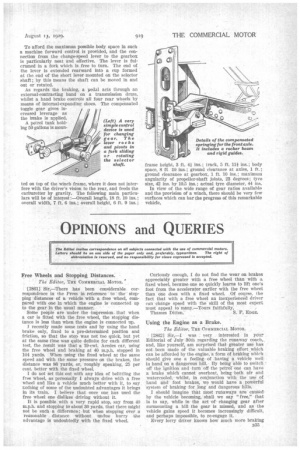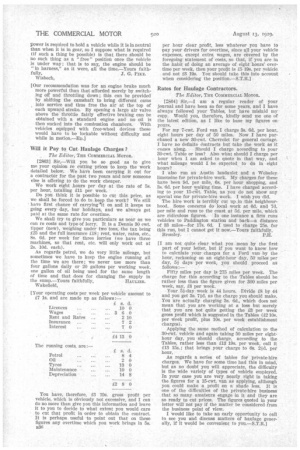OPINIONS and QUERIES The Editor invites correspondence on all subjects connected with the use of commercial motors.
Page 61

Page 62

If you've noticed an error in this article please click here to report it so we can fix it.
Letters should be on one side of the paper only and, preferably, typewritten. The right of abbreviation is reserved, and no responsibility for views expressed is accepted.
Free Wheels and Stopping Distances.
The Editor, THE COMMERCIAL MOTOR.
[2861] Sir,—There has been considerable corres-pondence in the Press in reference to' the stopping distances of n vehicle with a free -wheel, compared with one in which the engine is. connected up tO the gear in the usual manner:
Some people are under the imPression_ that when a car is fitted with the free wheel, the stopping distance is less than when the engine is connected up.
recently made some tests and by using the hand brake only, fixed to a pre-determined position and friction, so that the stop was not too quick, but yet at the same time was quite definite for each different test, the result was that a 19-cwt. Acedes car, using the free wheel and braking at 40 m.p.h. stopped in 104 yards. When using the fixed wheel at the same speed and with the same pressure on the brakes, the distance was 86 yards, or, roughly speaking, 25 per cent. better with the fixed wheel.
I do not set this out with any idea of belittling the free wheel, as personally I always drive with a free wheel and like a vehicle much better with it, to say nothing of some of the undoubted advantages it brings in its train. I believe that once one has used the free wheel one dislikes driving without it.
It is possible with a very rapid stop, say from 40 m.p.h. and stopping in' about 30 yards, that there might not be such a difference; but when stopping over a reasonable distance without undue hurry the advantage is undoubtedly with the fixed wheel.
Curiously enough, I do not find the wear on brakes appreciably greater with a free wheel than with a fixed wheel, because one so quickly learns to lift one's foot from the accelerator earlier with the free wheel than one does with a fixed wheel.. Of course, the fact that with a free wheel an inexperienced driver can change speed with the skill of the most expert must appeal . tomany.—Yours faithfully, Thames Bitten.' S. 11', EDGE.
. • • •
Using the Engine as a Brake.
The Editor, THE COMMERCIAL MOTOR.
[2862,1 Sir,—I was very interested in your
. .
Editorial of July 30th regarding the runaway coach,, and, like yourself, am surprised that greater usehas not been. made of the valuable braking effort ..which can be afforded by the engine, a form of braking which , should give one a feeling of having a vehicle well in hand on .a dangerous hill.BY being able to switch. off the 'ignition and -turnl off the petrol one can have a brake Which cannot overheat, being -both. air and watercooled;. whilst, in conjunction with the use of hand and foot brakes, we .wauld have a powerful system of -braking-for long' and dangerous hills.
I should imagine that /host 'runaways arecauk-ed by the vehicle leComing, shall we say "free," that is to say, while in the act .of changing gear after surmounting a hill the gear is missed, and as the vehicle gains speed it becomes increasingly difficult, and perhaps impossible, to re-engage it.
Every, lorry driver knows how much more braking
power is required to hold a vehicle while it is in neutral than when it is in gear, so I suppose what is required (if such a thing be possible) is that there should be no such thing as a " free" position once the vehicle is under way ; that is to say, the engine should be "in harness," as it were, all the time.-Yours faith
fully, J. G. PIKE. Wisbech.
[Our recommendation was for an engine brake much more powerful than that afforded merely by switching off and throttling down; this can be provided by shifting the camshaft to bring different cams into service and thus free the air at the top of each upward stroke. By opening a large air valve above the throttle fairly effective braking can be obtained with a standard engine and no oil is then sucked into the combustion chambers. With vehicles equipped with free-wheel devices these would have to be lockable without difficulty and while in motion.-ED.]
Will it Pay to Cut Haulage Charges ?
The Editor, THE COMMERCIAL MOTOR.
[2863] Sir,-Will you be so good as to give me your opinion re cutting prices to keep the work detailed below. We have been carrying it out for a contractor for the past two years and now someone else is offering to do the work cheaper. • We work eight hours per day at the rate of 5s. per hour, totalling ill per week.
Do you think it is possible to cut this price, as we shall be forced to do to keep the work? We still have first chance of carrying it on and it keeps us going every day, bar holidays, and we always get paid at the same rate for overtime.
We shall try to give you particulars as near as we can re costs and type of lorry. It is a Dennis 30 cwt. tipper (new), weighing under two tons, the tax being £25 and the full insurance £18; rent, water, rates, etc., 8s. 6d. per week for three lorries (we have three machines, so that rent, etc. will only work out at 2s. 10d. each).
As regards petrol, we do very little mileage, but sometimes we have to keep the engine running all the time we are there; we never use more than four gallons daily or 20 gallons per working week. one gallon of oil being used for the same length of time and that does for changing the supply in
the sump.-Yours faithfully, HAULIER. Wakefield.
[Your operating costs per week per vehicle amount to £7 Is. and are made up as follows :
You have, therefore, £3 19s. gross profit per vehicle, which is obviously not excessive, and I can do no more than give you this information and leave it to you to decide to what extent you would care to cut that profit in order to obtain the contract. It is perhaps useful -to point out that on these figures any overtime which you work brings in 5s. B.36
per hour clear profit, less whatever you have to pay your drivers for overtime, since all your vehicle expenses, except extra wages, are cbvered by the foregoing statement of costs, so that, if you are in the habit of doing an average of eight hours' overtime per week, then your profit is £5 19s. per vehicle and not £3 19s. You should take this into account when considering the position.-ST.R.1




















































































































